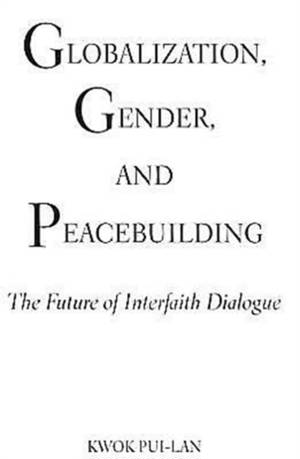
- Afhalen na 1 uur in een winkel met voorraad
- Gratis thuislevering in België vanaf € 30
- Ruim aanbod met 7 miljoen producten
- Afhalen na 1 uur in een winkel met voorraad
- Gratis thuislevering in België vanaf € 30
- Ruim aanbod met 7 miljoen producten
Zoeken
Globalization, Gender, and Peacebuilding
The Future of Interfaith Dialogue
Kwok Pui-Lan
Paperback | Engels
€ 11,45
+ 22 punten
Omschrijving
Religion has played an enormous role in contemporary politics and in the discussions of war and peace, identity and tradition, authoritarianism and democracy. In the Madeleva Lecture for 2011 Kwok Pui-lan, one of the most prominent postcolonial feminist theologians, discusses the future of interfaith dialogue. She shows how globalization has impacted interreligious relationships and dialogue and argues that the future of interfaith dialogue must include those marginalized voices that have not been invited to the table, especially women. In discussing issues on gender and interfaith dialogue, she explores concerns that have been raised by women, such as the Orientialist construction of religious difference, reciprocity, and misappropriation, and multiple identities and hybridity. Finally, a central focus for interfaith dialogue is peacebuilding, and in this context Dr. Kwok explores the concept of polydoxy, which goes beyond the logic of the One to embrace multiplicity and relationality. +
Specificaties
Betrokkenen
- Auteur(s):
- Uitgeverij:
Inhoud
- Aantal bladzijden:
- 112
- Taal:
- Engels
Eigenschappen
- Productcode (EAN):
- 9780809147724
- Verschijningsdatum:
- 1/03/2012
- Uitvoering:
- Paperback
- Formaat:
- Trade paperback (VS)
- Afmetingen:
- 109 mm x 165 mm
- Gewicht:
- 90 g

Alleen bij Standaard Boekhandel
+ 22 punten op je klantenkaart van Standaard Boekhandel
Beoordelingen
We publiceren alleen reviews die voldoen aan de voorwaarden voor reviews. Bekijk onze voorwaarden voor reviews.











